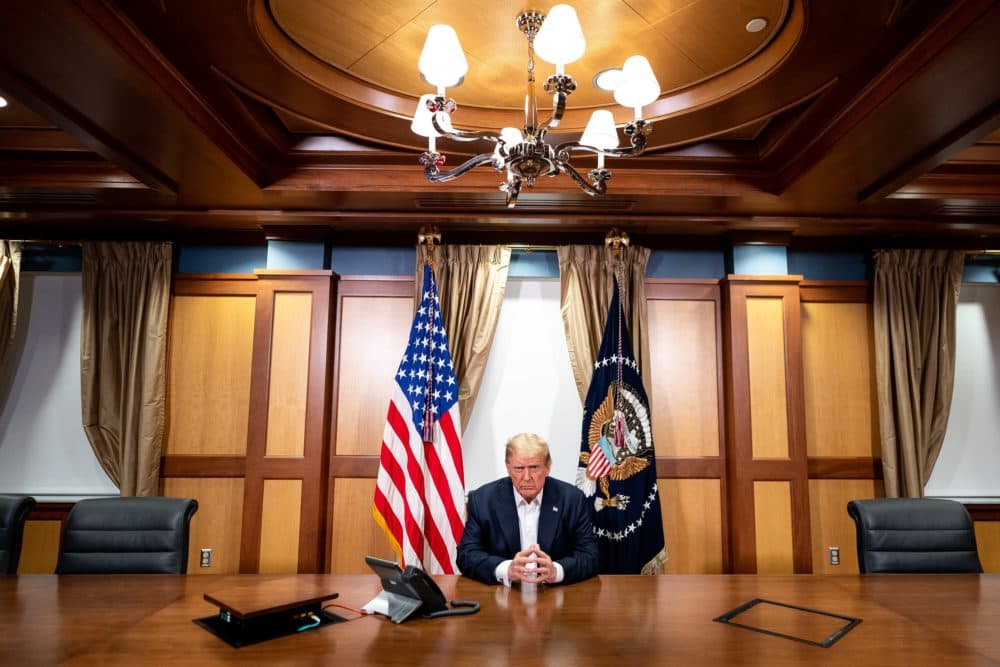Advertisement
Here & Now's 2020 Election Coverage
Fears Trump Could Lose Election, Refuse To Step Down Inspire Thousands To Learn Peaceful Resistance
Resume
Since 1776, Americans have voted in 58 presidential elections. And every time, the losing candidate has conceded and power was peacefully transferred from the outgoing to incoming president.
This year, incumbent Donald Trump has refused to confirm that he'll concede if declared the losing candidate — though his administration assured voters he would. Still, many are taking Trump at his word and are training for peaceful resistance to what they call the worst-case scenario: a power grab.
Thousands have been mobilizing under the national umbrella group Protect The Results to nonviolently resist what they see as a possible coup. One of the groups involved, Choose Democracy, has been holding online training sessions in nonviolent resistance, something 83-year-old founder George Lakey has vast experience with. The longtime activist and author wrote the manual for the Mississippi Freedom Summer Project.
Choose Democracy began when folks saw the need to build a social movement in order to respond if there’s a power grab after the election, Lakey says. The group gathered resources, developed an online training program and wrote a pledge of nonviolent resistance that anyone can sign.
Lakey is clear: He says he will respect the results of a fair election where all votes are counted and doesn’t want to witness a power grab unfold. But he wants Americans to be prepared if the worst-case scenario plays out.
While he thinks a coup with military action is unlikely, he says other forces are at play, including the Republican-majority Senate and armed militias, such as the Proud Boys, who Trump urged to "stand back and stand by."
“So if he were to be this reckless — and I really hope he won't — we need to be ready,” Lakey says.
Choose Democracy has researched movements that have successfully resisted nonviolently, he says, and one key lesson is to mobilize people across the political spectrum who believe deeply in defending democracy.
The late American Gene Sharp, author of “From Dictatorship to Democracy” and once a mentor to Lakey, advised people around the world on how to protest autocratic regimes. Serbians say his teachings enabled them to bring down Slobodan Milošević.
“If we're going to use these symbolic methods, like picketing, that won't bring down the government. To bring down an oppressive regime is to pull out the supports from the regime,” Sharp told Here & Now in 2011. “It's like a table. If they're termites eating those wooden legs, eventually they get very wobbly and eventually will collapse.”
That metaphor is exactly what Lakey has been teaching in Choose Democracy’s non-violent dissent training. When pillars of a successful government begin to buckle, “that’s when the coup plotters fail,” he says. That means persuading people within the government’s pillars to join the effort of resistance — whether it be through letter-writing, sit-ins or strikes.
While strikes aren’t a large part of American culture, it can be “one of the most powerful methods” of dissent, he says. The Federation of Labor in Rochester, New York, has said if there is a power grab by Trump, they will declare a general strike.
Individual strikes, including consumer boycotts, are just as important, he says.
“Holiday seasons coming up,” Lakey says. “We could tell business leaders we're not going to do holiday shopping until you come out firmly for democracy for every vote being counted.”
People participating in the training may have never protested before, so Lakey says the Choose Democracy program also prepares folks on what to do if they are met with violence.
He says he relies on lessons learned through Martin Luther King Jr. and the civil rights movement, where Black people in the South “were able to meet violence successfully through nonviolence and minimize the injuries that occurred to them.”
The reality of the presidential election is complex, and Lakey acknowledges that. Millions of Americans support President Trump, who has falsely told followers that Democrats are rigging the election. Lakey says he “honors” Americans’ right to vote for Trump.
But the line needs to be drawn if there’s a “hijacking job” of the presidency, he says. Lakey, along with many others, says he won’t give up on democracy.
Karyn Miller-Medzon produced and edited this interview for broadcast with Robin Young. Serena McMahon adapted it for the web.
This segment aired on November 2, 2020.

